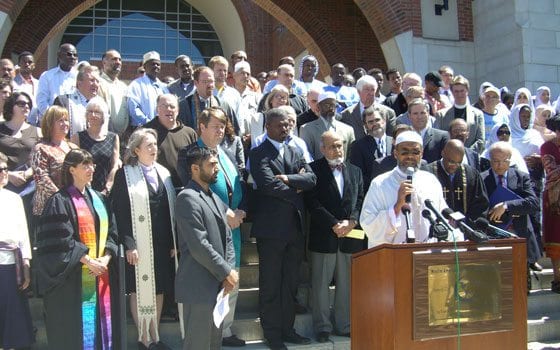
Muslim leaders in Massachusetts fired back Friday at gubernatorial candidate Tim Cahill, who they accused of making “bigoted” statements after Gov. Deval Patrick met with members of the Muslim community.
In a statement, a coalition of Muslim leaders called Cahill’s remarks “bigoted … undignified” and “anti-democratic,” and said the governor has a right to meet with members of all religious backgrounds.
Patrick met last month with around 1,200 Massachusetts Muslim leaders who wanted to raise awareness about their faith and become more civically engaged.
At the Islamic Society of Boston Cultural Center (ISBCC) forum, Muslims, alongside religious and community leaders from around the state, engaged the governor on issues like racial profiling and rights in the workplace.
Patrick agreed to develop sensitivity trainings for educators and law enforcement, and to strengthen ties with the local Muslim community.
“Yours is a peaceful faith, and I know that,” the governor said. “I know you are worried that others know that.”
In his statement after Patrick attended the meeting, Cahill boldly declared, “I fully support equal protection under the law for every American, regardless of race or creed, but this is political correctness run amok … Now is the time for Governor Patrick to look radical Islamic terrorism full in the face.”
Noting two Muslim Americans recently were arrested in Massachusetts in connection with the probe of the attempted Times Square bombing, Cahill added: “Governor Patrick should stop playing politics with terrorism and focus on protecting all the citizens of this commonwealth.”
Cahill is the state Treasurer and former Democrat who has launched an independent campaign for governor.
“He is our governor and he has a right to meet with any religious organization,” said Kemal Bozkurt, publisher of the Lawrence-based Muslim Green Pages of New England, a directory of Muslim-owned businesses.
Bozkurt said if Cahill has any evidence that a mosque or Massachusetts Muslim group has terrorist ties he should turn it over to Attorney General Martha Coakley instead of stereotyping. “Those comments are unacceptable,” Bozkurt said. “Muslims must take action and not vote for a candidate like this.”
But this type of campaign barb is nothing new — especially before a tight election.
During the 2008 presidential election, Barack Obama — who lived briefly in Muslim-majority Indonesia, and whose Kenyan father is Muslim — faced similar criticism. Right-wing critics accused Obama of being Muslim — as if practicing Islam was the same thing as committing a terrorist act.
Gov. Patrick has also lived in Muslim-majority countries Sudan and Nigeria, and began the ISBCC forum with, “Hello, how are you” in Arabic.
Even after his election, Obama continued to face criticism for his engagement with Muslims.
Nearly a year ago to the day, Obama — just a few months into his presidency — delivered a speech at Cairo University in Egypt, as a gesture of good will toward Muslims. The speech attempted to restore U.S. relations with the Muslim world, which had been severely damaged under previous administrations.
“I have come here to seek a new beginning between the United States and Muslims around the world,” the president said, “one based upon mutual interest and mutual respect; and one based up on the truth that America and Islam are not exclusive.”
Right-wing politicians and pundits decried the speech as “un-American” and “giving 9/11 sympathizers a voice.”
But Cahill’s statement went beyond a campaign attack of Patrick, and rebuked the thousands of Muslims who live in Boston.
“The bottom line is, someone in Boston knew about this before it happened and didn’t speak up,” he said in reference to the recent attempted car bombings in New York City. Cahill’s accusations came in the absence of any evidence of Boston Muslims’ prior knowledge of the attack, and despite the ISBCC’s numerous public denunciations of terrorism.
The day after the statement’s release, Muslim, Christian and Jewish leaders from Roxbury and the greater Boston area organized to speak out against Cahill.
Sufia Hassan, a female leader and educator at the Mosque for the Praising of Allah in Boston, said remarks like those from politicians only give cover for some to “go after” Muslims.
“I feel as if myself and my children are being attacked,” said Hassan. “I was very offended.”
Bilal Kaleem, president and executive director of the Muslim American Society Boston chapter, called Cahill’s statement “divisive and wounding” because it “effectively blamed the entire Muslim community . . . for harboring terror.”
Moreover, he said, it suggested, “The top public official in our state should not have met with over 1,000 of his constituents.”
“We condemn the politics of division, the politics of fear and the politics exclusion represented by these remarks and any others like them,” Kaleem said.
Rev. Ray Hammond of Bethel AME Church also expressed his “disgust” at Cahill’s criticism of the “full engagement of our Muslim friends in the democratic process.”
“If we or our political leaders really cared about our safety,” Hammond said, “the last thing we can afford is the cynical manipulation of our fear and the exploitation of our religious differences. This stereotyping, this divisiveness, this barrier-building has been the greatest impediment to the dream inscribed on the seal of the United States: E Pluribus Unum, from many, one.”
Cahill defended his comments late Friday, saying that his criticism was not directed at the Muslim American community or at Gov. Patrick for attending a meeting with their leaders.
“It was about the lack of leadership Governor Patrick has shown in combating the threat of terrorism,” Cahill said. “The governor missed an opportunity throughout this entire process to have an important conversation about coming together to combat terrorism.”
“Instead the governor turned it into a conversation about sensitivity training for police,” Cahill said in a statement. “That is simply not an adequate response to the threat that we face. That is not leadership.”
The Associated Press contributed to the story






